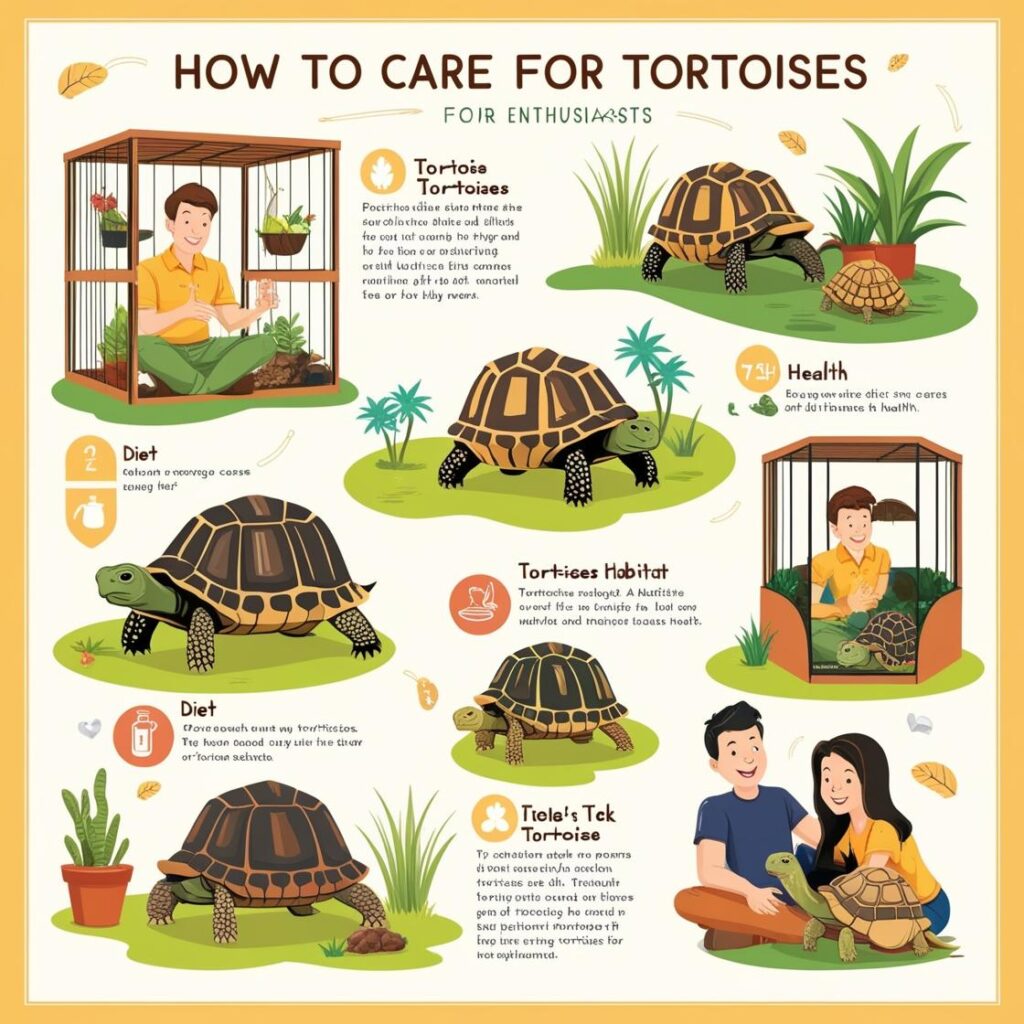Tortoises have captured the hearts of many as beloved pets due to their unique characteristics, intriguing personalities, and fascinating biological traits. However, owning a tortoise is a serious commitment that requires an understanding of their specific needs to ensure a healthy and fulfilling life for these remarkable reptiles. In this blog post, we will delve into the essential care requirements for tortoises, covering housing, diet, health care, and enrichment to provide a holistic guide for both new and experienced tortoise owners.

Understanding Tortoise Species
Before diving into care specifics, it’s important to note that there are various species of tortoises, each with their unique requirements. Common pet tortoises include:
- African Sulcata Tortoise (Centrochelys sulcata): Known for their large size and sociable demeanor.
- Russian Tortoise (Testudo horsfieldii): A smaller tortoise, well-adapted for life in captivity with a manageable size.
- Greek Tortoise (Testudo graeca): Recognized for their distinctive patterns and hardy nature.
- Red-footed Tortoise (Chelonoidis carbonarius): Found in the rainforests of South America, they prefer a more humid environment.
Understanding the species you’re caring for is paramount, as it dictates many aspects of their care, from diet to habitat requirements.
Housing Requirements
Creating a suitable habitat is critical for the health and well-being of your tortoise.
1. Indoor Housing
If you choose to keep your tortoise indoors, consider the following:
- Enclosure Size: A tortoise needs ample space; a minimum of 4×2 feet for smaller species, while larger species like the Sulcata will require as much space as possible. Custom enclosures or large indoor pens with walls at least 18 inches high will help prevent escapes.
- Substrate: Use a mixture of soil, coco coir, and sand to create a naturalistic substrate that allows burrowing, which is a natural behavior for tortoises.
- Temperature and Lighting: Tortoises are ectothermic, relying on external temperatures to regulate their body heat. Provide a basking area of 90-100°F (32-38°C) and a cooler area of around 70-80°F (21-27°C). Use UVB lighting to facilitate vitamin D3 synthesis, essential for calcium metabolism. Ensure the light is on for 10-12 hours a day.
2. Outdoor Housing
If you live in a suitable climate, outdoor housing can offer your tortoise natural sunlight, which is crucial for their health:
- Enclosure: Build a secure, escape-proof outdoor pen with a shaded area to shield them from excessive sun. The pen should be large, ideally 10×10 feet or bigger, allowing them to roam freely.
- Soil and Vegetation: Allow them access to natural substrates and ensure that the area is free of harmful plants. Native grasses and edible flowers will provide not only stimulation but also a natural source of food.
While outdoor environments have many benefits, be vigilant of predators and ensure your tortoise can access shelter from extreme weather conditions.
Diet and Nutrition
Feeding your tortoise the right diet is one of the most critical aspects of their care. Here’s a closer look at dietary needs:
1. Herbivorous Diet
Most tortoises are strict herbivores, relying on a diet primarily composed of:
- Grasses and Hay: Offer a variety of grasses and grass hays, which are high in fiber and help with the digestive health of your tortoise. Timothy hay and orchard grass are excellent choices.
- Leafy Greens: Dark leafy greens like collard greens, dandelion greens, and kale can be included. Introduce these gradually to avoid any digestive upset.
- Fruits and Flowers: Treats such as strawberries, hibiscus flowers, and other fruits should be given sparingly due to their high sugar content. They should complement a diet rich in fiber rather than dominate it.
2. Calcium and Vitamin Supplements
Calcium is essential for tortoises, especially to prevent metabolic bone disease. Provide calcium powder supplement sprinkled on food several times a week and ensure they receive proper UVB exposure to synthesize vitamin D3 effectively.
Health Care
Maintaining your tortoise’s health requires diligence and regular vet visits:
1. Veterinary Care
- Regular Check-ups: Schedule annual veterinary visits or as recommended, especially with a vet who specializes in reptiles. They can check for common issues such as respiratory infections, shell abnormalities, and parasites.
- Enclosure Maintenance: Sand and substrate should be kept clean to prevent bacterial growth. Remove waste daily, and perform thorough cleans regularly.
2. Signs of Illness
Be alert to signs that may indicate your tortoise’s health is compromised, including:
- Lack of appetite
- Changes in behavior or activity levels
- Respiratory distress (wheezing, open-mouthed breathing)
- Shell deformities or discoloration
- Weight loss
Prompt veterinary attention is critical to resolving health issues quickly.
Enrichment and Socialization
Tortoises are intelligent creatures that benefit from environmental enrichment and stimulation:
- Toys and Exploration: Create an engaging environment with various textures and objects to encourage exploration. Safe rocks, logs, and non-toxic plants can serve as both playthings and hiding spots.
- Social Interaction: While some tortoises enjoy companionship, others might be more solitary. Monitor your tortoise’s behavior closely if housed with others to prevent bullying or stress.
- Routine Handling: Gentle, regular handling can help your tortoise become accustomed to human interaction. This should always be approached with care, respecting their comfort levels.
Conclusion
Caring for a tortoise is an enriching yet challenging endeavor that requires sufficient knowledge, commitment, and patience. By understanding the specific needs associated with the species you own, providing a suitable habitat, offering a nutritious diet, and maintaining their health proactively, you can ensure a prosperous and happy life for your shelled companion. Just as in any pet ownership, the love and responsibility you invest will reflect upon the flourishing life of your tortoise, creating a rewarding bond that transcends time.
As you embark on this journey, stay curious, continue learning, and embrace the joys of tortoise care. With dedication and understanding, your tortoise will thrive and become a cherished member of your family for many years to come.